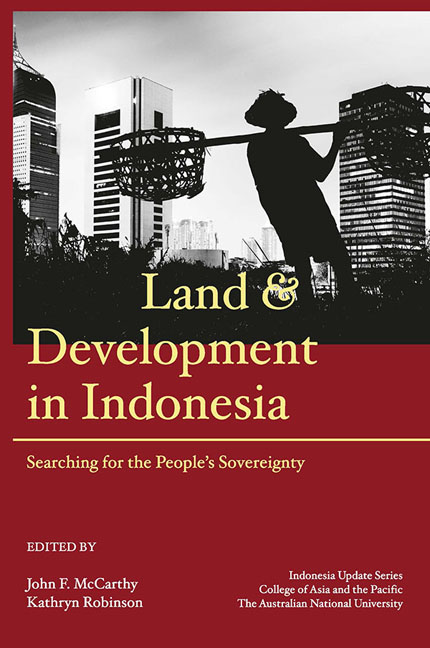Book contents
- Frontmatter
- Contents
- Tables
- Figures
- Contributors
- Acknowledgements
- Glossary
- Map
- 1 Land, economic development, social justice and environmental management in Indonesia: the search for the people's sovereignty
- PART 1 LAND USE AND LAND LAW: THE BIG PICTURE
- PART 2 ENVIRONMENTAL AND CUSTOMARY FRAMING OF LAND TENURE
- PART 3 URBAN AND INFRASTRUCTURE DEVELOPMENT
- PART 4 AGRICULTURE, LAND TENURE AND LIVELIHOODS
- PART 5 LARGE-SCALE LAND ACQUISITIONS AND SMALLHOLDER DEVELOPMENT
- 13 Industrial plantations and community rights: conflicts and solutions
- 14 How can the people's sovereignty be achieved in the oil palm sector? Is the plantation model shifting in favour of smallholders?
- 15 Beyond special autonomy and customary land rights recognition: examining land negotiations and the production of vulnerabilities in Papua
- Index
- Miscellaneous Endmatter
13 - Industrial plantations and community rights: conflicts and solutions
from PART 5 - LARGE-SCALE LAND ACQUISITIONS AND SMALLHOLDER DEVELOPMENT
Published online by Cambridge University Press: 29 July 2017
- Frontmatter
- Contents
- Tables
- Figures
- Contributors
- Acknowledgements
- Glossary
- Map
- 1 Land, economic development, social justice and environmental management in Indonesia: the search for the people's sovereignty
- PART 1 LAND USE AND LAND LAW: THE BIG PICTURE
- PART 2 ENVIRONMENTAL AND CUSTOMARY FRAMING OF LAND TENURE
- PART 3 URBAN AND INFRASTRUCTURE DEVELOPMENT
- PART 4 AGRICULTURE, LAND TENURE AND LIVELIHOODS
- PART 5 LARGE-SCALE LAND ACQUISITIONS AND SMALLHOLDER DEVELOPMENT
- 13 Industrial plantations and community rights: conflicts and solutions
- 14 How can the people's sovereignty be achieved in the oil palm sector? Is the plantation model shifting in favour of smallholders?
- 15 Beyond special autonomy and customary land rights recognition: examining land negotiations and the production of vulnerabilities in Papua
- Index
- Miscellaneous Endmatter
Summary
The right of indigenous peoples to give or withhold their free, prior and informed consent (FPIC) to developments that will affect them is articulated in the United Nations Declaration on the Rights of Indigenous Peoples, which was passed with a resounding majority by the UN General Assembly in September 2007. Voluntary industry standards for timber (set up by the Forest Stewardship Council) and oil palm (through the Roundtable on Sustainable Palm Oil) recognise the necessity for both indigenous peoples and local communities to enjoy the right to give or withhold their free, prior and informed consent. Following pressure from customers and investors, many of the biggest companies in these sectors in Indonesia have committed to follow these standards, even as Indonesia's Ministry of Foreign Affairs continues to insist that the nation does not have any indigenous peoples, and that the Declaration on the Rights of Indigenous Peoples therefore does not apply to Indonesia. The voluntary industry commitments to respect community rights, combined with advocacy by civil society, have put pressure on the Indonesian government to provide greater recognition of the rights of local communities and indigenous peoples.
Companies that sign up to the voluntary industry standards are obliged to respect customary (adat) land rights and the right to FPIC, and to attempt to resolve any outstanding conflicts that impinge on those rights. Both companies and non-government organisations have lobbied the Indonesian government to make uniform environmental and social commitments mandatory for all concession holders. There are indications that national regulations on important issues such as the identification and protection of environmentally significant areas, the right to FPIC and access to conflict resolution mechanisms are being strengthened due to these advocacy efforts (Dewan Kehutanan Nasional and UN-REDD Programme Indonesia 2011). In 2015, for example, both the Ministry of Agrarian Affairs and Spatial Planning and the Ministry of Environment and Forestry issued regulations that provide much greater scope for communities affected by plantations to have their rights to land recognised.
For both companies and governments seeking to acquire land, the process of obtaining consent from community landholders is a central issue (Colchester et al. 2006; Afrizal 2007, 2010, 2013; Colchester and Chao 2013). The question of consent concerns recognition of and respect for a community's rights to land, and is particularly important given the rapid expansion of pulp and paper and oil palm plantations across Indonesia.
- Type
- Chapter
- Information
- Land and Development in IndonesiaSearching for the People's Sovereignty, pp. 297 - 314Publisher: ISEAS–Yusof Ishak InstitutePrint publication year: 2016



